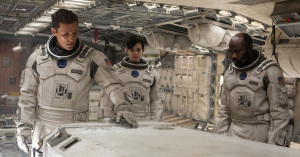
Christopher Nolan’s space opera “Interstellar” begins on more terrestrial grounds on planet Earth, set in the near future. Humanity has regressed to a more primitive condition where agriculture and farming are centerpieces of society, at least in the community we are shown at the beginning, as people struggle to survive on a barren planet, left short of resources. Our protagonist, Cooper (Matthew McConaughey), is a former NASA pilot turned farmer caring for his teenage son and much younger daughter Murphy. They’re shown trying to get through their everyday lives, where events like dust storms like those from 1930s America are more than rare occurrences.
Cooper imbues scientific wisdom to his inquisitive daughter Murphy throughout, and following one of these aforementioned dust blazes, they discover a gravitational anomaly that lends them coordinates to a covert NASA station. It’s covert since the masses would question government funding to a space program when basic human needs aren’t necessarily met for the majority of Americans. Here, Cooper is introduced to Professor Brand (Michael Caine) and his daughter Amelia (Anne Hathaway), who reveal a space exploration mission to another galaxy through a wormhole, where hopefully lies humanity’s chance at a new beginning. And naturally, Cooper joins the operation given his history with the organization.
From this point forth, the movie provides truly emotive scenes that would soften even the most hardened men, beginning with an emotionally gruesome farewell between Cooper and his family. The young Mackenzie Foy plays the part of “Murph” to perfection here, refusing to acknowledge her father’s departure and leaving their relationship in limbo as time and space come between the two for the rest of the film’s screening.
The other cast members also do an impeccable job. McConaughey continues in his Oscar-winning form from “Dallas Buyers Club” here, despite playing yet another Southerner, a role he seems to be familiarizing himself with too often. Nolan’s regulars Caine and Hathaway, who play father and daughter, do their parts equally well in supporting roles, and provide some much needed points of debate when it comes to ethics in the film. The movie never really had a clearly defined antagonist, until that was resolved by the surprise appearance of a celebrity actor whom I didn’t know was even part of the cast. I will not reveal his identity since his entrance alone was startling, and should give way to some wide-eyed gasps in the audience.
Setting that aside, Jessica Chastain’s performance as an older Murphy must be commended by the highest regard. Following her entry halfway through, she provided some truly poignant moments in the film, serving as the chief perspective to narrate the happenings on Earth while McConaughey’s Cooper traverses another galaxy.
Hans Zimmer, Nolan’s go-to music composer, provides a truly original score for Nolan’s latest entry, free from his trademark electronica and drum beats seen in works such as “The Dark Knight” trilogy and “Inception.” The primary instrument here is the organ, and he creates something that is truly celestial, providing spine-tingling sensations at all the key moments of the film. The music befits a movie where exploration is a central component, and the score manages to accentuate an atmosphere of hope and fear, staples in any given epic adventure of the unknown.
My only issue with the film was most of the visual work relating to the cosmos. At times, the special effects didn’t seem as refined or crisp as they should have been. This was the pervading feeling I got when introduced to the wormhole and the other celestial bodies presented later on. The effects used seemed to be a little dated for my liking, and I’m not sure if Nolan wanted to pay homage to “2001: A Space Odyssey” by doing so. To me, however, it felt like those strange graphics from music equalizers on a PC’s media player.
Unlike his last mind-warping experience “Inception,” the ending of “Interstellar” isn’t ambiguous by any means. It answers the audience’s questions to an extremely satisfying end, striking a perfect equilibrium between finality and yearning for more. On a final note, though, it must be pointed out that this film, to me at least, was always about a relationship between a father and daughter. On his quest to save humanity, Cooper puts light-years between himself and his family, especially his daughter, and while distance factors in, we mustn’t forget how the progression of time gets distorted with space travel. Because of that, the film is an actual race against time, and about whether a father can keep his promise of returning home to his daughter.

